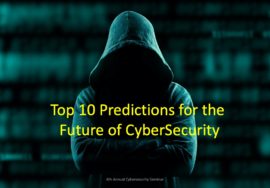
TAG IoT Hackathon Recap
From Winning a Hackathon to Judging a Hackathon
Last November, I posted my journey of entering and winning the MobilityLIVE Hackathon.

2016 MobilityLIVE Hackathon
Less than a week later, I judged HackATL at Emory University. That’s where I met Annemarie Stockinger; she led her team to a win at HackATL with their personal safety device. Annemarie is currently launching her first Kickstarter campaign on 9/22/2017 for GoSafely. Congratulations Annemarie!

I’m a volunteer on the planning committee for the TAG IoT Symposium on August 31, 2017. This event is a 1-day conference in Atlanta with distinguished speakers, sponsors, and attendees from across the ecosystem of IoT Innovation.

As a part of the festivities leading up to the TAG IoT Symposium, John Whitten leads the TAG IoT Hackathon, August 11 – 13 at the ATC Innovation Center. John secured the location, created the theme, schedule, requirements, and solicited participants and volunteers. Great job John Whitten!
Greater Atlanta Internet of Things (GATN) Meetup
Before the hackathon starts on Friday, August 11, John Whitten organizes a pre-Hackathon panel discussion with his organization, Greater Atlanta Internet of Things on Tuesday, August 8th at Tech Square Labs. I’m the moderator of the Hackathon panel, and my panelists are Jon Latham, Luigi Ray-Montanez, Lance Gleason, and David Khasenye.
Key Points:
What is a Hackathon? Luigi, Co-Founder, Code for Atlanta, and Marta Hackathon leader, explained that a Hackathon was a rapid development of ideas into viable solutions usually over a weekend. Side Note: The next Marta Hackathon will be held on September 8-9 at The Garage at Tech Square.
Who should enter hackathons? The panel agreed that everyone should enter hackathons, not just developers. David Khasenye discussed the importance of the project manager to keep the team on schedule. Other panelists discussed the importance of a business development person who could present and articulate the solution to the judges. They also brought up that not all hackathons are coding related, some hackathons are around design or pitching ideas.
Keys to Winning a Hackathon? Jon Latham, 5-time hackathon winner, stressed the importance of presenting a great demo and presentation for the judges.
Hackathon Successes – David Khasenye discussed an important business deal he closed due to his participation in a hackathon. Lance Gleason encouraged everyone to have fun at Hackathons, and that hackathons are about more than just money and exposure.
The panel strived to educate and inspire the a new generation of hackers.

Hackathon Panel at Tech Square Labs
TAG IoT Hackathon – August 11-13, 2017
Friday, August 11, 2017
2:00 – 3:30 PM
On Friday afternoon, August 11, we kick-off the hackathon with a showcase of IoT technologies.
Kristen Ottofy, Microsoft Mentor, is on hand to provide Microsoft resources for the hackathon.
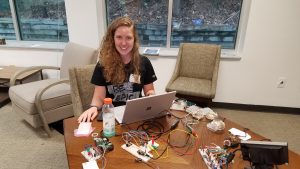
5:00 – 6:00 PM
General Orientation from John Whitten with all participants, mentors, coaches, and judges.
6:00 – 7:00 PM
The judges are organized into judging teams of 5 judges and one lead judge each. John Whitten and Ben Cagle review the process with the judges.
There are 4 judging rounds:
- Round One – Friday Night – Question and Answer Panel – Each team presents their overall solution for 10 minutes, followed by an interactive discussion with the judges for 20 minutes. 30 minutes total per team.
- Round Two – Saturday Noon – Solution Concept Pitch – Each team pitches their solution concept for 15 minutes, followed by feedback from the judges for 15 minutes. 30 minutes total per team.
- Round Three – Saturday Night – Proof of Concept Presentation – Each team demos and presents their proof of concept to the judges for 20 minutes, followed by Q&A with the judges for 10 minutes. 30 minutes total per team. Judges determine which teams will compete in the final round.
- Round Four – Sunday Afternoon – Final Round – A subset of the current judges with new judges will come in on Sunday to determine the overall winner.
- The winner will be decided on Sunday, but not revealed until the TAG IoT Symposium (weeks later) on August 31, 2017.
Here is the breakdown of judges and teams.
Group 1
Head Judge: Caroline Dunn
Judges: Bob Smith, Mike Himelstein, Pete English, Ranjit Gangadharan
Teams judged (in alphabetical order): Helm8, Knights, V1

Group 2
Head Judge: Gloria Rismondo
Judges: Renee Pearson, Forrest Hill, Paul Wertz
Teams judged (in alphabetical order): Fan-X, Kickoff, Out Loud

Before I go any further, this is not a “tell all” type post. I will refrain from giving specifics on individual team performance. The intent of this article is to provide insights into what goes on at a hackathon and recap of the 2017 TAG IoT Hackathon.
8:00 – 9:30 PM – Judging Round 1 – Q&A Panel
Judges gather in their designated conference room.
8:00 – 8:30 PM – Team 1 Q&A Panel
8:30 – 9:00 PM – Team 2 Q&A Panel
9:00 – 9:30 PM – Team 3 Q&A Panel
9:30 – All judging teams reconvening and teams are ranked within each judging team with all coaches.
10:10 pm – Judges are dismissed.
Saturday, August 12, 2017
9:00 AM – 12:00 PM – Teams meet to continue working on their projects
I’m not at the Hackathon. I’m running the Vinings Downhill 5K.
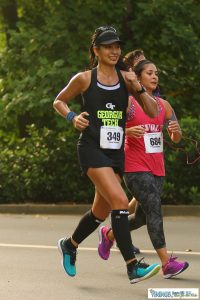
11:30 AM – 12:00 PM – Judges Briefing
12:00 – 1:30 PM – Judging Round 2 – Solution Concept Pitch
Each team presents a concept design or description of what their solution concept will look like. Judges provide feedback. 30 minutes total per team individually.
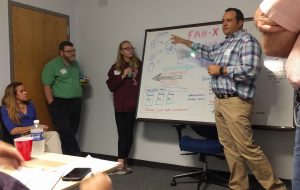
Teams that do well in round 2 have taken the judge’s feedback from the previous round and addressed the feedback by showing they did some research and/or making some modifications to their project.
1:30 – 1:45 PM – Judges rank teams
1:45 – Coaches are brought in to view their ranking and are given the opportunity to ask questions. Judges explain that the 3rd round of judging is worth 60% and it is still anybody’s game.
2:30 pm – Judges dismissed until 5:30 PM
Some judges stick around while others go home for a few hours.
2:30 – 5:30 PM
Reina Lingle, Melissa Sorrentino and I work together to document the Hackathon. Reina tweets from @IoT_GA (the official TAG IoT Symposium twitter channel), Melissa gathers the teams for pictures, and I start recording testimonials from the event from judges and coaches.
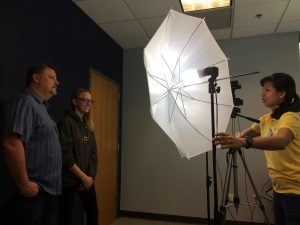
5:30 PM – Judges reconvene for a briefing with John Whitten.
At this point, the brevity starts sinking in. The 2 judging teams are each told to eliminate one team and send 2 teams into the final round on Sunday. Sunday will consist of 4 of the 9 current judges plus a few new judges (for fresh eyes). Each finalist team will be required to present their entire solution one at a time to the new judging panel between 2 and 4 pm on Sunday.
7:00 – 8:30 PM – Judging Round 3 – Proof of Concept Presentation
Instead of teams presenting in the judge’s conference room, judges come to the teams to experience the presentation and demos. It’s make or break time now.
8:30 – 9:00 PM – Judges deliberate on the team to eliminate and the 2 teams to advance. As head judge, I start by taking a poll of judges on the team to eliminate.
My judging panel is spilt between 2 teams on the team to eliminate. We’ve spent 2 days with these teams and have become emotionally attached to all 3 teams. We’re having a “Bachelor” moment, “I didn’t know letting go of one [team] would be so hard.” The judging panel debates, not just the presentation, but also the relevance to IoT and the premise of the Hackathon itself.
Once, the decision is made, we immediately take off our judging hats and become coaches. The sentiment shifts to, “I’m sending my babies off to war!” My entire judging team agrees to stay after the announcement is made so that we can provide coaching to the two teams we have chosen to advance to the final round. The other judging team led by Gloria does the same.
9:00 PM – John Whitten announces the 4 teams advancing to the final round and what to expect for Sunday.
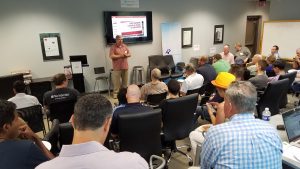
Immediately after the announcement, we approach the coaches and request a debrief with the team and judging panel.
9:15 – 9:45 PM – Team 1 enters the conference room. For the first time, the team gets to sit. We’re no longer judges. We’re preparing our teams for battle. We give them every piece of coaching we can. We encourage them. We lift them up. We congratulate them.
9:45- 10:15 PM – Team 2 – same drill – Everyone is tired. Judges, Coaches, Hackers, all tired.
10:30 PM – Time to go home.
Sunday, August 13, 2017
Sunday is a new day. I’m no longer a judge. I’m the videographer. I have a new helper. Michael Lane is his name and Physics is his game. He was a Physics major at Georgia Tech.
We work with Melissa to take pictures and capture a video demo of each team. At 4:00 PM we wrap. People are tired from the weekend. Michael asks if we can edit and publish the videos on his laptop. I’m too tired. I pack up and go home.
It takes me a week to go through the video and photos. I produce a video of each team and then I make a recap video.
Videos from the Hackathon:
Acknowledgements:
Thank you John Whitten for leading a very successful and competitive hackathon. Great job!
Thank you to all of the hackathon participants, judges, mentors, coaches, and volunteers! I witnessed amazing teamwork! Thank you Ben Cagle for leading all judges.
Special thanks to my judging team, Bob Smith, Mike Himelstein, Pete English, Ranjit Gangadharan, you guys were dedicated to the hackathon.
Thank you Reina Lingle, Melissa Sorrentino, and Michael Lane for partnering with me to document this amazing event.




